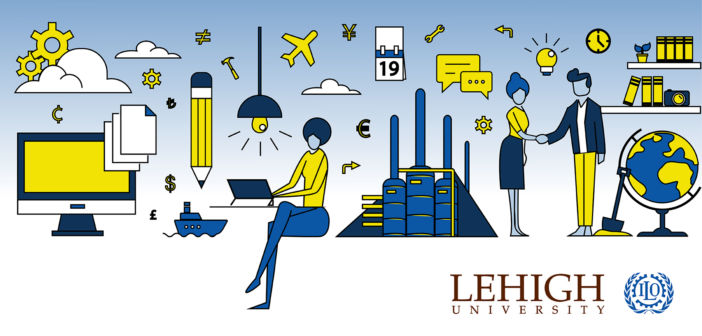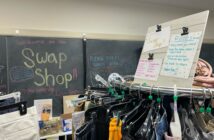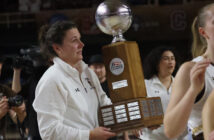Elliot Harris, chief economist for the United Nations, and world-renowned economist Alan Krueger of Princeton University were chosen to be the keynote speakers at the International Labour Organization’s (ILO) 100th anniversary conference.
Harris and Krueger will give their takes on “An Equitable and Sustainable Future of Work” at Lehigh on April 11 after the university and South Bethlehem were selected to be the primary host in the United States.
Bill Hunter, the director of fellowship advising and UN Programs, said Harris is expected to highlight his experience with the UN by talking about the workforce from a global perspective. Krueger, who served as assistant secretary of the treasury for economic policy under the Obama administration, will likely speak on a more national tone, Hunter said.
Additionally, Hunter said the event has been labeled as a certified meeting by the UN and will be co-sponsored by Rotary International District 7340 — spanning from the Poconos to near Philadelphia — a subset of the global network of over 1.2 million people that focuses on community action.
Approximately 50 presidents, directors and other high-level individuals from UN NGOs will be bussed from New York City that morning to attend the conference on Mountaintop in Iacocca Hall.
“A table could look like three Lehigh students, a Lafayette student, two NGO presidents and the head of a corporation,” Hunter said.
With big name partners and speakers to create buzz and only 250 seats in the Iacocca Wood Dining Room, interested parties will need to register soon or view the event by video, which will broadcast on UN Web TV. Lehigh students, staff and faculty who register can attend the event for free. Non-university attendees can buy a ticket for $25.
Because the conference is nearly one month away, lead-up events are in full swing, and a planning committee has finalized much of what the day will look like, with the exception of some speakers who are waiting to be confirmed.
Ever since Lehigh’s participation was confirmed, the committee of faculty and staff members from across the university has been coordinating with Kevin Cassidy, the director of the ILO Office for the United States, to tackle the objective of encompassing the future themes of the global workforce in one, jam-packed day.
To many, projecting the future of work might instinctively conjure up an image of an entirely automated world, with artificial intelligence manifesting into the world-changing technology that many believe it to be.
But Andrew Ward, a professor of management who is serving as a committee member, sees other core topics as integral to discussing the future of work.
“Artificial intelligence and robotics can weave into the whole supply chain in terms of distribution and systems,” Ward said.
That’s why the committee deemed the following three topics to be fundamental to a conversation about the workforce — education, equality and supply chains.
The core subjects will be discussed through moderated panels entitled, “Effective Lifelong Learning Systems,” “A Transformative Agenda for Equality,” and “Improving Global Value Chains for Decent Work.”
Notable panelists include Gary Bolles, the chair for the future of work for Singularity University; W. Gerard “Jerry” Oleksiak, the secretary of the Pennsylvania Department of Labor & Industry; and William Gaudelli, the new dean for Lehigh’s College of Education.
However, the planning committee realized that no matter how impactful the panels are, student involvement is key.
“I personally find it amazing that this conference can connect the points of view of students, as future workers of businesses, but also of the third party: legislators, government members and rule-setters,” said Gabriela Hrubcova, ’19G, who interned for Cassidy’s office at the ILO in Washington D.C. this past summer.
Hrubcova’s point aligns with the special position that the ILO can expose students to as the only tripartite UN agency — having government, worker and employer representation.
With an emphasis on the students themselves as being the primary people who will be affected by the issues at hand, conference-goers will hear from students giving five-minute TEDx-style talks in between panels.
Three students have been confirmed thus far: David Morency, ‘18, a recent Schwarzman Scholarship recipient, will discuss China’s role in global markets; and Gili Remen, ‘19, a journalist who comes from South African and Israeli heritage, will discuss the future prospects of the media environment and a student who will discuss how to address special education in his home country. One or two more will be announced soon, Hunter said.
The conference will finish its agenda at Iacocca Hall at 3 p.m., at which time it will transition to the National Museum of Industrial History in Bethlehem for a closing reception.
The museum’s involvement will shed light on the local implications of a transformation in the global workforce. It has immortalized the rise and fall of Bethlehem Steel, with the goal of its opening being to “forge a connection between America’s industrial past and the innovations of today.”
The conference is set to foreshadow major changes to the workforce, discussed by some of the leading experts in both industry and academia.
“People that ordinarily wouldn’t come to campus are all going to be there on one day to mark this event and think about these important topics,” Ward said.






Comment policy
Comments posted to The Brown and White website are reviewed by a moderator before being approved. Incendiary speech or harassing language, including comments targeted at individuals, may be deemed unacceptable and not published. Spam and other soliciting will also be declined.
The Brown and White also reserves the right to not publish entirely anonymous comments.